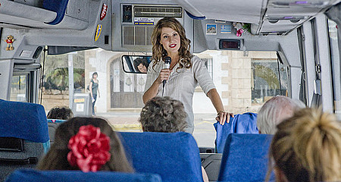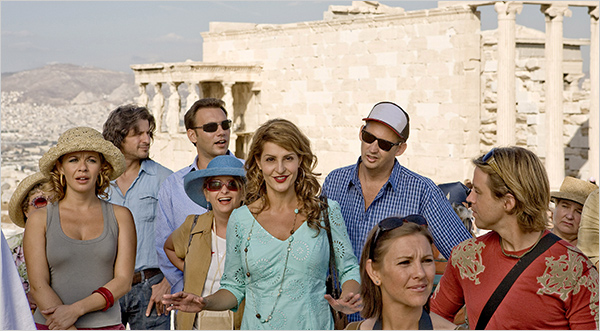 |
|
|
My Life in Ruins |
|
Film Review By April Kalogeropoulos Householder Nia Vardalos' long-awaited film, My Life in Ruins quietly opened this weekend in the U.S., without the benefit of big advertising dollars from Fox's Searchlight Studios. The film is centered on Vardalos' character, Georgia, an out of work Greek-American classics professor who comes to Greece to find her "kefi", and in the meantime, works as an English-speaking tour guide of the ancient monuments. Her boss favors a rival guide, Nikos, who gets top marks on his evaluations by pandering to the toursists' Western desires for beaches, tavernas, shopping, and ice cream, over the more historical (and boring) information doled out by Georgia. Nikos gets the bus with air conditioning and is assigned a better tour group, |
|
|
mostly made up of polite Canadians, an in-joke with Vardalos who is herself, Greek-Canadian. In contrast, Georgia's unsavory group consists of the Ugly Americans (played by SNL's Rachel Dratch and Harland Williams) who seem to have an affinity for red, white and blue t-shirts; an incomprehensible Aussie couple who carry oversized cans of Foster's Larger wherever they go; a crotchety elderly couple; an overweight American college kid; an obnoxious, cell phone- addicted IHOP manager; an uptight and dysfunctional British family; two just-divorced-and-on-the-prowl Spanish spinsters; and an old woman with a penchant for shoplifting from trinket shops in Plaka. |
|
| Unfortunately, it's almost impossible to view this film without thinking about My Big Fat Greek Wedding. The weight of what that film accomplished for Greek visibility in Hollywood will forever be linked to Vardalos's image. The success of My Big Fat Greek Wedding is a moment in film history that can only be compared to the other persistent image (and one that is consciously noted in the film), that of Anthony Quinn as Zorba the Greek. In fact, at times it was difficult for me to separate her Wedding character, Toula from that of Georgia. I found myself wondering, is this Toula, now estranged from her husband, Ian, fleeing to Greece to regain her kefi after a horrible divorce? But maybe that's just because I'm Greek and seeing Greek people |
 |
| and places on a huge screen in a Cineplex is always an exciting "event." Starved for images of Greekness, Vardalos will forever (however unfairly) be a representative for all things Greek. Regrettably, all of the shortcomings of Vardalos' first film are repeated here, and magnified. Sure, My Big Fat Greek Wedding was an over-the-top, predictable, and highly stereotypical portrayal of the Greek-American experience. A Greek version of the modern day fairy-tale, the film was complete with a finale that included all of the cliches associated with the narrative arc of the romantic comedy genre: the girl-gets-boy ending. The climax, a Greek Orthodox wedding, replete with sentimental ouzo toasts and the always present circle dance, reinforced many stereotypes about Greeks that have persisted since Anthony Quinn performed his own hasapiko in 1964's Zorba the Greek. Greeks posses an indescribable lust for life, and when they find themselves in a difficult situation, they dance. When they celebrate, they dance. Other familiar archetypes in the film included a paranoid, Turk-hating yiayia clad in all-black, two bickering and controlling Greek parents, an ignorant and over-protective brother, a man-hungry Aunt Toula, and all set in a marble-columned family diner. Certainly, the film did not challenge audiences either formally or thematically. Reactions to the film, including those by many Greeks, both in Greece and throughout the diaspora, complained about the "simple-minded" portrayals, "exaggerated," "ludicrous," even "malicious" depictions of Greek Americans. As Aliki Efstathiou has argued, |
|
In virtually every scene, Greeks are characterized as lascking a moral compass, crass, vulgar... We are presented as being devoid of knowledge or concern for anything beyond our immediate sphere, living in some vacuum of overwhelming stupidity and bad taste. How - and pay close attention to this point - is it possible that anyone in the Hellenic community doesn't realize and fully understand that the non-Greek public believes this movie to be a true and accurate portrait of Greeks. Most of them will assume that this is how all Greeks act, think, and live. By most accounts, My Big Fat Greek Wedding did not break any ground concerning depictions of Greeks. In fact, as Efstathiou's comments demonstrate, these stereotypical portrayals, with their undying dialog about the classical past, may have actually set us back a few millennia. (see "My Big Fat Greek Wedding: A Dissenting View": http://www.helleniccomserve.com/mybigfatgreekwedding4.html) Similarly, reviews of Vardalos' latest film, My Life in Ruins, have featured descriptors such as "unremarkable" (Miami Herald); "familiar and predictable as a Greek diner" (The Hollywood Reporter); "superficial and unconvincing" (Chicago Sun Times); and have gone as far as to call the film "self-loathing" (Village Voice). The only character who seems to have any depth is the Jewish widower, Irv (Richard Dreyfuss) who upstages Vardalos in a scene when he impersonates the oracle at Delphi. However, by providing the spiritual voice of the film, Irv is a familiar role typically reserved for the ethnic character. Perhaps director Donald Petrie (How to Lose a Guy in 10 Days, Miss Congeniality, Grumpy Old Men, Turner and Hooch) should have cast Morgan Freeman in this role to really drive home the ethnic and gendered clichés. As for romance, this time, Georgia finds love in her transformed bus driver, Poupi Kakas (Greek actor Alexis Georgoulis), who goes from looking like an unkempt and inarticulate mountain shepherd to a sensitive, spiritual, and well-groomed Greek god. In the end, there's no sappy wedding, but there is a final shot of the couple overlooking the Parthenon by the light of a full moon. Cliche, indeed. |
|
|
|
 |
|
(see Under the Tuscan Sun, How Stella Got Her Groove Back, Shirley Valentine.) One also has to wonder about the shameless product placements (how much did IHOP pay to have their name mentioned so often in the warn-out jokes around pancakes?) And to make things worse, there is a homophobic scene in which two predatory sex-crazed gay Greek men prey on the naïve American college student who unknowingly wears a shirt that says "Enter from the rear" in Greek. Reportedly, Vardalos fought to have this scene cut from the film, but lost the battle with producers, a fact that is puzzling considering one of the producers is her friend and former collaborator, Rita Wilson. Like her follow-up film, Connie and Carla, there may be too many expectations around My Life in Ruins to live up to the unexpected $300 million surprise of Vardalos' first film. So far, the film cost $17 million to make, and over the opening weekend it grossed $3.2 million. Let's hope that at least Greek people will buy the dvd, and it eventually breaks even. Otherwise, it may vary well be Vardalos' career that's left in ruins. |
|
|
(Posting date 18 June 2009) HCS encourages readers to view other articles and releases in our permanent, extensive archives at the URL http://www.helleniccomserve.com/contents.html. |
|
|
|
|
2000 © Hellenic Communication Service, L.L.C. All Rights Reserved.
http://www.HellenicComServe.com |
|
